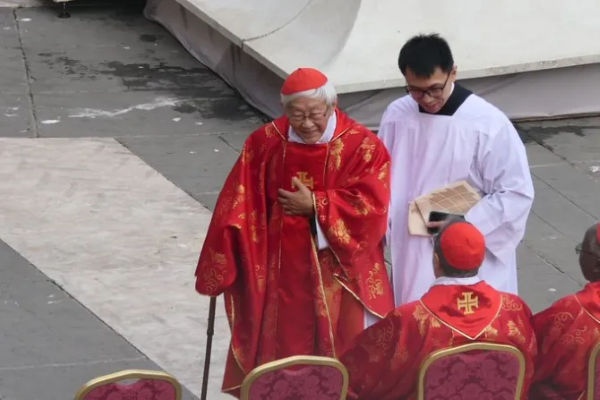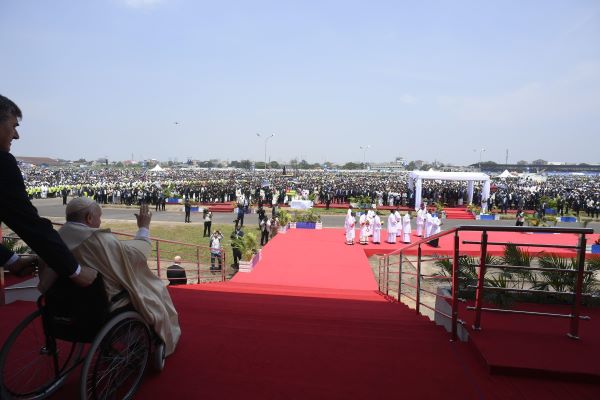Pope Francis made a rallying cry for peace in the Democratic Republic of Congo as he presided at a Mass for more than one million people and strongly condemned those profiting from violence in the country.
The 86-year-old pontiff began the second day of his Africa visit by travelling to N’dolo airport, on the outskirts of Kinshasa, where huge crowds had gathered to participate in the papal liturgy, the second biggest of the Francis pontificate.
Later in the day, he listened to heart-rending stories of those who had suffered atrocities during the conflict in the Eastern part of the country, where fighting continues over Congo’s vast natural resources.
In the most moving scenes of the trip, the survivors said they had forgiven their perpetrators, and all knelt in front of Francis as he blessed them.
Throughout the day, the Pope had a consistent message: Christianity is incompatible with any kind of violence, and believers should devote themselves to becoming builders of peace.
There was a joyful and noisy atmosphere from start to finish at N’dolo, with people waving flags and singing as the Pope entered the airfield in his popemobile.
A colourful scene saw women dressed in traditional costumes with a picture of “Pape Francois” blazoned across their outfits while priests held up their iPhones and cameras to catch a picture of Francis as he greeted the crowds of mostly young people.
Primary-school-age girls in white dresses danced in front of Francis during the liturgy, a white and yellow-robed choir sang non-stop, and the priests wore vestments decked out in traditional Congolese patterns.
The papal Mass had elements of the Zaire use of the Roman Missal, a fruit of the Second Vatican Council's liturgical reforms incorporating parts of Congolese culture.
It was celebrated in the local language of Lingala and French. DR Congo is one of the most linguistically diverse countries in the world and the bidding prayers were said in Tshilubà, Swahili and Kikongo.
In his homily, the Pope emphasised that Christ’s message of peace is “for everyone” and that Christians must do everything they can to “break the cycle of violence”.
He said believers should become less focused on their own affairs and “rights” and become bearers of peace.
He then addressed those who “call themselves Christians” but engage in violence.
“The Lord is telling you: ‘Lay down your arms, embrace mercy’,” Francis said.
“We need to find room in our hearts for everyone – to believe that ethnic, regional, social and religious differences are secondary and not obstacles, that others are our brothers and sisters, members of the same human community.”
Cardinal Fridolin Ambongo, the Archbishop of Kinshasa, said he hoped that the celebration of the Eucharist, which the country’s political leaders attended, would help bring the “true and lasting peace that our country so desires”.
The Pope has already shown a determination to speak out against the exploitation of Congo’s natural resources, giving a hard-hitting speech where he told the rich world to keep their “hands-off Africa”.
It is a message that has chimed with the people, according to Abbé Tresor Muteba, a priest of the Archdiocese of Congo, who said before the Mass that the Pope is bringing a strong message of reconciliation.
He repeated it when meeting survivors from Bunia, Beni-Butembo, Goma, Masisi, Rutshuru, Bukavu, Uvira, in the eastern part of the county.
Francis had initially planned to visit Goma, but this was scrapped due to security fears.
During the meeting in the apostolic nunciature in Kinshasa, the Pope listened intently as a young man, Ladislas Kambale Kombi, said that his father was killed in front of him, and his mother was kidnapped and never returned.
Bijoux Makumbi Kamala explained how she was repeatedly raped by a soldier over 19 months and had twins – whom the Pope then blessed during the meeting – and Emelda M’karhungulu said she had been kept captive as a sex slave.
All those who spoke said they had forgiven those who had committed atrocities against them, and each of them laid items representing their suffering, including a machete, at the foot of the cross.
“What a scandal and what hypocrisy, as people are being raped and killed…the commerce that causes this violence and death continues to flourish!” Francis said.
“I make a heartfelt appeal to all the people, to all the internal and external organisations that orchestrate war in the Democratic Republic of the Congo in order to plunder, scourge and destabilise the country.
“You are enriching yourselves through the illegal exploitation of this country’s goods and through the brutal sacrifice of innocent victims.
“Listen to the cry of their blood, open your ears to the voice of God, who calls you to conversion.”
But the Pope stressed that hatred and violence can never be an acceptable response for Christians, saying that “we must say a clear and strong ‘no' to all those who seek to perpetrate these in God’s name”.
He warned them not to be “seduced by individuals or groups that incite violence in his name, for God is a God of peace, not of war”.
Francis praised the survivors of conflict for taking the path of reconciliation, for being able to forgive and for “rejecting war and conflict as a means of resolving differences”.
At the same time, the Pope has not shied away from calling the deaths and suffering in Congo a “forgotten genocide” which he said the international media has largely ignored.
He went on: “The Cross was itself an instrument of torture and death, the most terrible in use at the time of Jesus, yet, transformed by his love, it has become a universal means of reconciliation, a tree of life.”
Francis finished the day with a meeting with representatives of charities who are offering vital social services in the country.
Bernard Balibuno, Cafod’s representative in Congo, said the Pope’s message of peace “highlighting how our resources have been robbed and exploited for decades” had touched Congolese hearts.
“This resonates strongly with my country. The silence on our country continues to amaze us, we ask ourselves why the international community closes its eyes on the DRC, when support is given quickly elsewhere,” he said.
Tomorrow, Francis will have separate meetings with young people, catechists, clergy and bishops, and on Friday departs for South Sudan.
Christopher Lamb, The Tablet’s Rome Correspondent, is among the journalists travelling with Pope Francis and is filing regular reports on the papal visit to Africa.



 Loading ...
Loading ...